A Post-Racial President . . .
Ellison Lodge, American Renaissance, March 2010
Ever since he caught the nation’s eye, Barack Obama has been careful not to be too black. At the risk of alienating the pushier segment of his natural constituency, he has tried to cultivate a “post-racial” image that does not scare off too many whites. It was a balancing act that worked well during the presidential election campaign, and culminated in an almost Second Coming-like atmosphere for the inauguration. However, after a year in office, Mr. Obama’s post-racial pose is wearing thin. Both his actions and his appointments reveal a leftist and implicitly racial agenda that is awakening whites to the fact that he does not stand for them. If he does not shore up his rapidly crumbling white support — and it is not clear how he could do that without repudiating much of his record so far — 2012 could be the end of the road for Barack Obama.
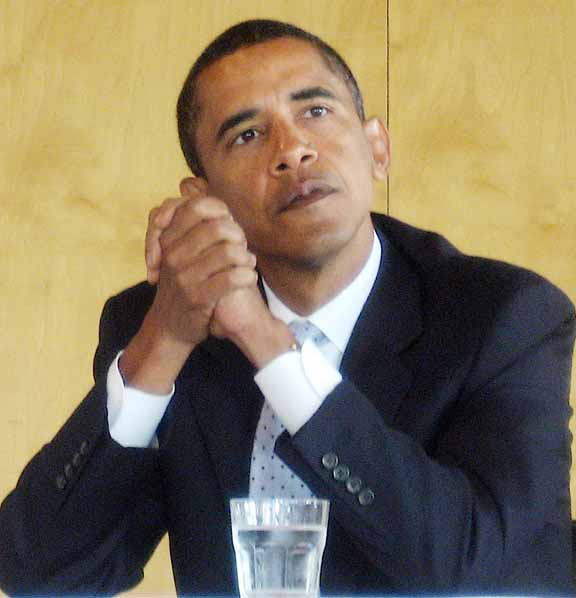
Sam Francis saw it first
Shortly before his death in February 2005, frequent American Renaissance contributor Sam Francis predicted Mr. Obama’s ascension to the presidency and explained the dangers of his post-racial façade:
Moreover, while openly racial candidates like Mr. Sharpton or Jesse Jackson helped instigate white racial consciousness — if they can be black, why can’t whites be white? — Mr. Obama works against it: If he’s neither white nor black, why should you be white? Mr. Obama, in other words, is both a living testament to the power of black racial consciousness and identity and at the very same time a living renunciation of white racial identity.
During the early part of his career, Mr. Obama plowed the same anti-white ground as Rev. Sharpton and Mr. Jackson, but by the time he came to prominence at the 2004 Democratic Convention as a state senator running for the US Senate, he had changed his tune. He criticized black ghetto behavior and proclaimed, “There is not a black America and a white America and Latino America and Asian America — there’s the United States of America.”
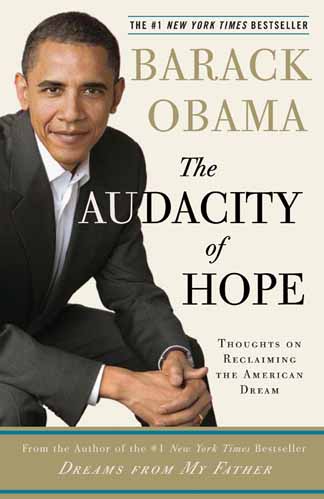
Taken from a sermon title.
Political observers immediately hailed him as the new breed of black politician. In one of the first major profiles of Mr. Obama, Ryan Lizza wrote in The Atlantic:
Mr. Obama’s ability to appeal to inner-city blacks, suburban moms, Republican dentists, and, well, me suggests that he’ll be able to venture further than most black politicians — further even than Carol Moseley Braun. ‘I’m rooted in the African-American community,’ he frequently says, ‘but I’m not limited by it.’ Indeed, charisma, intelligence, and ambition, tempered by a self-deprecating wit, are the particular hallmarks not so much of a great black politician as of any great one.
In 2004, Al Sharpton sought the Democratic nomination but failed miserably. Many could not help but notice how different Mr. Obama was from Mr. Sharpton. University of Michigan African American Studies professor Angela Dillard said, “I think this is really the end of an era of race and politics. Something’s shifting and changing and people like Sharpton can’t change with it, and something new and different is being created and it is about people like Obama.”
Yet the difference was in style rather than substance. Jonathan Tilove, then the race and immigration correspondent for Newhouse News, observed that Mr. Obama “can argue for policies virtually indistinguishable from Sharpton’s in cooler, non-racial terms, while still affirming a message of racial identity and uplift implicit in his very being.”
Mr. Obama won the Senate election in a landslide, in large part because Republicans thought they could counter his post-racial blackness by running buffoonish black conservative and non-Illinois resident, Alan Keyes. Among Keyes’s absurd and allegedly conservative stances was a proposal to exempt blacks from the Income Tax as a form of reparations.
Mr. Obama was being groomed as the Great Non-White Hope for the Democrats as soon as he arrived in the Senate. He made little effort as a legislator, and focused on 2008. Post-racial platitudes in speeches aside, he voted like a typical black politician, winning a “100 Percent” report card from the NAACP for 2005-2006. He received an “Incomplete” for 2006-2007 only because he was so busy campaigning he missed a lot of votes. Still, when he bothered to show up in Washington, he never voted against the NAACP’s wishes.
In his book The Audacity of Hope, Mr. Obama explained the importance of disguising an anti-white stance in universalistic blather. Because of “the success of conservatives in fanning the politics of resentment — by wildly overstating, for example, the adverse effects of affirmative action on white workers,” America had become a place where:
Rightly or wrongly [clearly, in his view, wrongly], white guilt has largely exhausted itself in America; even the most fair-minded of whites, those who would genuinely like to see racial inequality ended and poverty relieved, tend to push back against suggestions of racial victimization — or race-specific claims based on the history of race discrimination in this country.
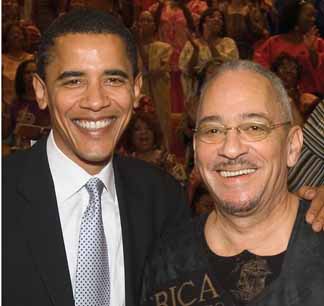
With his pastor in happier times.
Rather than suggest that blacks should abandon their racial grievances, he urges them to promote them in universal terms. Whites will still vote against their interests if the alternatives are presented in terms of the general welfare. Mr. Obama hinted at this in a speech in 2007:
[Those who worked on civil rights in the past realized that] to achieve racial equality was not simply good for African-Americans, but it was good for America as a whole; that we could not be what we might be as a nation unless we healed the brutal wounds of slavery and Jim Crow. Now, we have made enormous progress, but the progress we have made is not good enough. As many have already mentioned, we live in a society that remains separated in terms of life opportunities for African-Americans, for Latinos, and the rest of the nation.
What better way for the nation to heal “the brutal wounds of slavery and Jim Crow” for the good of both whites and blacks than to elect a biracial president? By the time Mr. Obama’s presidential campaign went into full swing, the idea that his election would end American racism had become conventional wisdom for many liberals and even for conservatives.
One of Mr. Obama’s supporters told MSNBC prior to the Iowa Caucuses that she planned to support him partly “to prove that America has overcome racism.” Writing in Slate, Jack Schaffer said that Mr. Obama represented “the fulfillment of the American ideal, and by casting their ballot for him, voters can participate in that transcendent moment.” The favorite word journalists used to describe his potential was “transformational.”
When it began to seem likely that Mr. Obama would receive the Democratic nomination, cracks appeared in his race-transcending window dressing. A few commentators, such as Steve Sailer, had called attention to Mr. Obama’s pastor, Jeremiah Wright. Rev. Wright is a proponent of militantly anti-white black liberation theology, and Mr. Obama named his book The Audacity of Hope after the title of one of Rev. Wright’s sermons. He also performed Mr. Obama’s marriage ceremony and baptized his children. Mr. Obama called Rev. Wright “a family member” and his “sounding board.” All this was largely ignored until Rev. Wright gave a lifetime achievement award to Louis Farrakhan. Minister Farrakhan, of course, has a long record of anti-white and anti-Jewish statements that would make even Al Sharpton blush.
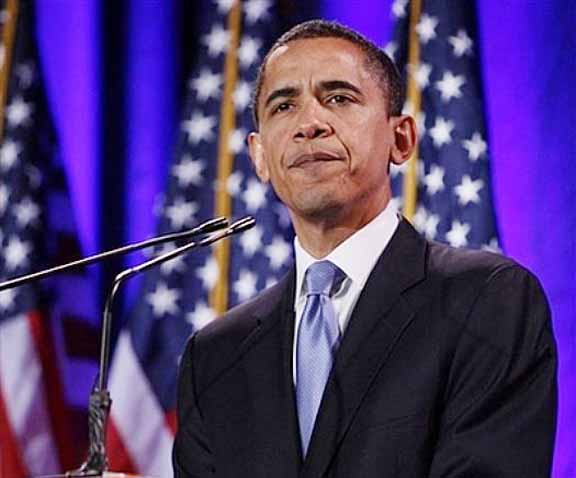
Damage control in Philadelphia.
In the ensuing weeks, more and more facts about Rev. Wright came to light. After September 11, he said that blacks should not sing “God Bless America” but “God Damn America.” Not anticipating his protégé’s ascension to the Oval Office, he told students at Howard University in 2006 that “racism is how this country was founded and how this country is still run. No black man will ever be considered for president.” For good measure, he accused the US government of inventing AIDS in order to exterminate blacks.
In an April 2008 appearance at the National Press Club, Rev. Wright said he did not “in any way disagree” with the originator of black liberation theology, Dr. James Cone, adding that “Jim” was a “personal friend.” This went over the reporters’ heads because they were unaware of Dr. Cone’s lurid views, just one sample of which is the following:
Black theology refuses to accept a God who is not identified totally with the goals of the black community. If God is not for us and against white people, then he is a murderer, and we had better kill him.
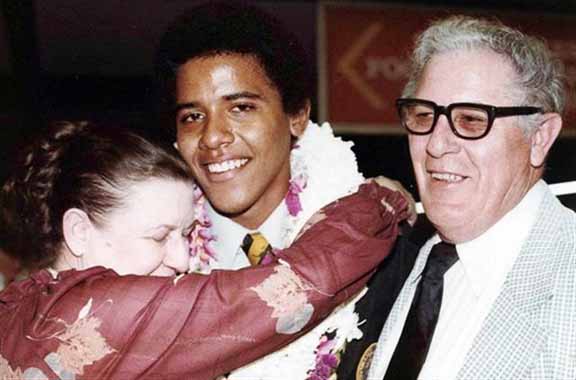
With grandpa and ‘racist’ granny.
Mr. Obama tried to control the damage with his famous speech in Philadelphia that liberals have since compared to the Gettysburg Address and the “I Have a Dream” speech. In fact, it was more of his usual combination of giving whites a few empty concessions about the need for blacks to take “full responsibility for their own lives” and acknowledging that whites have “legitimate concerns” about affirmative action and immigration, while still blaming the problems facing blacks on discrimination and white “resentments.”
He tried to portray Rev. Wright as a crazy uncle rather than a mentor, comparing him to his supposedly racist grandmother:
I can no more disown him [Rev. Wright] than I can disown the black community. I can no more disown him than I can my white grandmother — a woman who helped raise me, a woman who sacrificed again and again for me, a woman who loves me as much as she loves anything in this world, but a woman who once confessed her fear of black men who passed by her on the street, and who on more than one occasion has uttered racial or ethnic stereotypes that made me cringe.
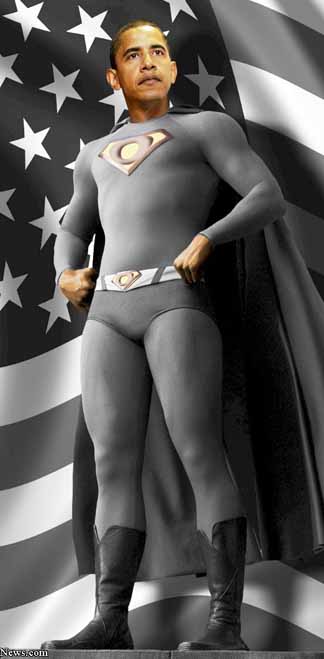
It turns out that his grandmother’s “ethnic stereotypes” were nothing more than her fear of an aggressive black beggar at a bus stop. She gave him a dollar but was afraid that if the bus had not come he would have attacked her. When Mr. Obama learned that the beggar’s blackness probably added to her fear, “The words were like a fist in my stomach.” Mr. Obama tells this story in his memoir of what amounts to a life of racial obsession. The book is essentially the tale of how a half white/half Kenyan raised by whites in Hawaii eventually succeeded in identifying as black.
During the campaign, while whites thought they saw a post-racial candidate, many blacks supported Mr. Obama solely because of his race. Radio shock jock Howard Stern sent a correspondent to Harlem who attributed several of John McCain’s positions to Mr. Obama and asked blacks if they supported them. For example, he asked, “Are you more for Obama’s policy because he’s pro-life or because he thinks our troops should stay in Iraq and finish this war?” He even asked, “Do you support Mr. Obama’s choice of Sarah Palin to be his VP?” One after another, blacks expressed their support for the black candidate and their ignorance of his positions.
Although they were better informed, even prominent black conservatives put race before ideology. Talk show host Armstrong Williams said, “I don’t necessarily like his policies; I don’t like much that he advocates, but for the first time in my life, history thrusts me to really seriously think about [voting Democratic].” As he explained to Fox News, “Among black conservatives, they tell me privately, it would be very hard to vote against him in November.”
Republican candidate John McCain refused to attack Mr. Obama for anything remotely racial. He denounced his own supporter, talk show host Bill Cunningham, merely for mentioning Mr. Obama’s middle name “Hussein” at a rally, and told the North Carolina GOP to kill a television ad that reminded voters of Rev. Wright. If this strategy was supposed to woo blacks, it failed utterly: Only 4 percent voted for him — fewer than for any Republican candidate since blacks got the vote.
In fact, Mr. McCain probably realized all along that he would get little black support. As Election Day approached, it was clear that only a radical shift in the campaign climate could save him. He might have been able to achieve that shift with a sustained television campaign hammering home how close Mr. Obama had been to Rev. Wright, and repeating the pastor’s most vitriolic anti-white diatribes. The media would have been scandalized but Mr. McCain might have won. Perhaps his fear of being accused of “playing the race card” was greater than his desire to be president.
Because Mr. McCain never challenged him on his association with Rev. Wright, Mr. Obama never had to justify it. Nor, did not bother to moderate his anti-white policies. He opposed black conservative Ward Connerly’s ballot initiatives to ban racial preferences in Colorado and Kansas, and at a debate in South Carolina he stated, “I think that the Confederate flag should be put in a museum” rather than displayed in public. He even hinted at support for reparations for slavery when he told a gathering of minority journalists, “I consistently believe that when it comes to whether it’s Native Americans or African-American issues or reparations, the most important thing for the US government to do is not just offer words, but offer deeds.”
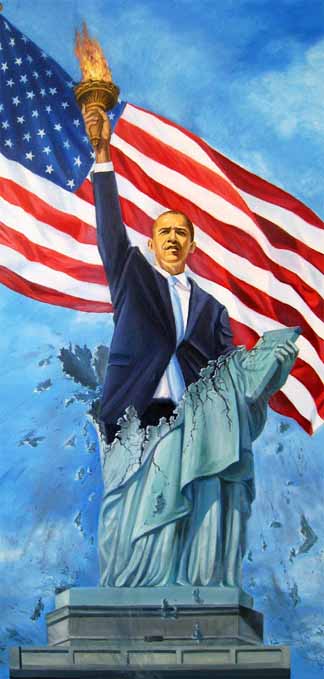
On immigration, Mr. Obama followed his leftist instincts and adopted the full anti-white position. The immigration-control group Numbers USA gave him an F for his record in the Senate. During the presidential campaign, blacks might have appreciated some expression of concern about Hispanic immigration — they oppose immigration even more strongly than whites do — but Mr. Obama already had their support. At the same time, Mr. McCain again made things easy for him by promoting essentially the same pro-immigration positions, thus driving away Republicans and whites who might have supported him.
Mr. Obama cultivated groups like the National Council of La Raza and the National Association of Latino Elected Officials, whom he told, “I’ve been working with Latino leaders ever since I entered public service more than 20 years ago . . . We stood together when I was a civil rights attorney, working to ensure that Latinos were being well represented. And we marched together to fix our broken immigration system. That’s why you can trust me when I say that I’ll be your partner in the White House.” He even blamed proponents of “xenophobia” for an imaginary crime surge, stating, “There’s a reason why hate crimes against Hispanic people doubled last year. If you have people like Lou Dobbs and Rush Limbaugh ginning things up, it’s not surprising that would happen.”
The pandering worked. Although McCain was the most vocal Republican supporter of amnesty, he received only one third of the Hispanic vote.
Mr. Obama ended up winning over 95 percent of the black vote — the highest figure for any Democratic candidate — but he received only 43 percent of the white vote. Mr. McCain’s 55 percent of the white vote would have been enough to hand him the election back in 1976 when whites were 89 percent of the electorate. Since then, mass immigration has cut that figure to 74 percent, so Mr. Obama won by a comfortable margin.
Liberals gloated over both the victory and the dispossession of whites. “The face of America is changing,” said CNN’s Soledad O’Brien. “And that face doesn’t look like Joe the Plumber.” In his concession speech, even John McCain congratulated Mr. Obama on overcoming “the old injustices that stained our nation” and “the cruel and painful bigotry” of the past.
When Mr. Obama took office, commentator David Horowitz gushed that “whatever happens in the Obama presidency, this Inauguration Day is a watershed moment in the history of America and a remarkable event in the history of nations, and thus a cause for all of us who love this country” because it symbolized victory over a racially divided past. New York Times columnist Paul Krugman went further: “If the election of our first African-American president didn’t stir you, if it didn’t leave you teary-eyed and proud of your country, there’s something wrong with you.”
In office
So how has America’s first non-white president acted in office? He is the first to appoint white men to fewer than half — 42 percent to be precise — of cabinet positions. Although whites are 66 percent of the total population and closer to 75 percent of Americans aged 42 to 60, they make up only 53 percent of all Senate-confirmed Obama appointments.
The most notable diversity appointment has been the first Hispanic Supreme Court justice, Sonia Sotomayor, who believes that “wise Latinas” make better judges than white men. Even the New York Times recognized that her entire career has been one of racial activism: “[She] has championed the importance of considering ethnicity in admissions, hiring, and even judicial selection at almost every stage of her career.” At Princeton she headed Accion Puertorriquena and at Yale Law School she joined the National Council of La Raza and the Puerto Rican Legal Defense and Education Fund (now LatinoJustice PRLDEF), where she became a board member. She filed complaints at both Yale and Princeton to hire more minority professors, protested the Bakke decision that limited outright quotas, and then ruled against white firefighters in the Ricci case.
Another “first” for Mr. Obama is black Attorney General Eric Holder. Two weeks after his Senate Confirmation, Mr. Holder gave a speech in which he called America “essentially a nation of cowards” because “we average Americans simply do not talk enough with each other about race.” He also noted that despite forced integration of schools and other institutions, the country remains “voluntarily socially segregated.”
In other words, even though we elected a black president and our media and political discourse are dominated by race, at a personal level, (white) Americans are not sufficiently concerned about blacks. This should have dispelled any idea that the election of Mr. Obama would heal America’s racial soul.
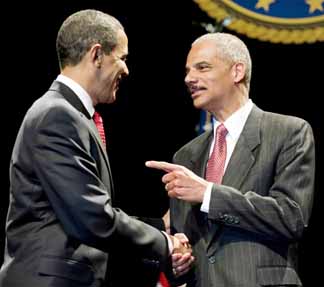
The President and his Attorney General.
Neoconservative journalist Jonah Goldberg pointed out the obvious:
[T]o the extent we don’t talk about race in this country the primary reason is that liberals and racial activists have an annoying habit of attacking anyone who doesn’t read from a liberal script as ‘racist’ or, if they’re lucky, ‘insensitive.’ Thus, ‘cowardice’ is defined as refusal to do as you’re told when that would in fact be the cowardly thing to do.
Mr. Holder has focused the Justice Department even more sharply on race cases, and says beefing up the civil rights division is his number-one priority. He says hiring an additional 50 civil rights lawyers is “really only a start” because President Bush inflicted terrible wounds on the civil rights effort “and it will take some time for them to fully heal.”
One way to “heal” is to use the Justice Department to ensure the election of black Democrats. Kingston, North Carolina, is two-thirds black. When the voters switched city council elections to a non-partisan ballot without party affiliations, the Justice Department blocked the change, claiming that party affiliation was “the single factor that allows black candidates to be elected to office.”
Mr. Holder doesn’t seem nearly so worried about voting rights for whites. During the 2008 election, the New Black Panther Party were videotaped intimidating white voters in Philadelphia. Liberal poll watcher Bartle Bull, who had monitored elections during the Civil Rights movement for the Kennedy administration, called it “the most blatant form of voter intimidation I have encountered in my life in political campaigns in many states, even going back to the work I did in Mississippi in the 1960s.”
This didn’t seem to bother Mr. Holder. Just before leaving office, the Bush administration had initiated an investigation, but four months later, just as a judge was about to enforce a default settlement against the party, Mr. Holder’s office dropped the case. “[T]he facts and the law did not support pursuing” it, a spokesman claimed.
Fortunately, a few Congressional Republicans, along with the US Commission on Civil Rights — which is independent from the Obama administration — are pursuing the matter but Mr. Holder’s office is ignoring subpoenas by the commission and requests from Congress to turn over internal memos.
Mr. Holder’s support for “hate crimes” legislation is also racially selective. He and Mr. Obama both urged passage of the Matthew Shepard Hate Crimes Prevention Act, which adds homosexuals as a new class of victims, but during Congressional hearings, the attorney general explained his views on hate-crimes bills in general. The new law would cover “crimes that have a historic basis,” meaning those against “people who are African-American, Hispanic, people who are Jewish, people who are gay, who have been targeted over — over the many years,” but not whites or Christians.
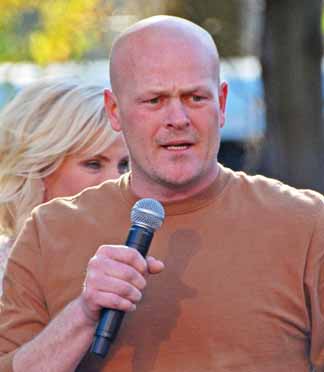
Samuel Joseph Wurzelbacher — “Joe the Plumber.”
There have been other colorful appointments. Mr. Obama’s Green Jobs Czar, Van Jones, became a self-professed communist after joining protests in the Rodney King case. After he abandoned communism, he organized rallies for Black Panther cop-killer Mumia Abu Jamal, and attended political events wearing T-Shirts saying “Kanye was Right” (referring to the rapper who said “George Bush doesn’t care about black people”). Mr. Jones withdrew his nomination after his radical views were exposed.
Another disquieting black appointment was Mr. Obama’s chief diversity officer for the Federal Communications Commission, Mark Lloyd. “There are few things I think more frightening in the American mind than dark-skinned black men,” he gloated. “Here I am.” There may be reasons to be afraid. He says that there are a limited number of important positions and they are filled with whites, “and unless we are conscious of the need to have more people of color, gays, other people in those positions we will not change the problem.”
Because Mr. Obama’s first year has been dominated by the health care debate, his legislative agenda has been relatively free of specifically racial issues. Still, his medical reorganization plan has a number of anti-white aspects that have undoubtedly encouraged opposition. The bill is full of loopholes that make government-funded medicine available to illegal aliens, and Rep. Joe Wilson’s cry of “You lie” when Mr. Obama denied this is widely considered a watershed moment in opposition to the bill.
Mr. Obama’s proposed cuts in Medicare also have a racial angle. Many liberals accuse conservatives of hypocrisy for opposing government expansion into health care while insisting on keeping Medicare. Yet the larger truth is that whites are less than half of the uninsured but over 90 percent of Medicare Plan B recipients, whose benefits would be taxed.
The president has not had much time for the “comprehensive immigration reform” he promised Hispanics, but his fiscal year 2011 budget request points the way: He wants to slash funding for the Secure Border Initiative (which includes the “virtual fence”) and cut 180 agents from the Border Patrol.
Mr. Obama’s most publicized racial comments came when he said white Cambridge police officer James Crowley “acted stupidly” when he arrested black Harvard Professor Henry Louis Gates for disorderly conduct. This was the well-known incident in which the professor had broken into his own house and became belligerent when Sergeant Crowley investigated what appeared to be a crime.
Mr. Obama’s comments polarized the nation. Seventy-eight percent of blacks approved of the way the president handled the incident, while only 23 percent of whites did. In the following week, his approval rating among whites fell from 53 percent to 47 percent. This started a long dive in ratings as whites began to realize that Mr. Obama is not post racial, but an advocate for blacks. Mr. Obama’s white approval rate has dropped from 61 percent at the time of his inauguration to the mid-30s as this article goes to press. His approval ratings among blacks remain over 95 percent. As the prominent liberal commentator Thomas Edsall notes, “White, middle-class voters ceased to think of Mr. Obama as a protector of their interests.” Perhaps they have begun to notice that, as black New York Times editorial board member Brent Staples likes to point out, Mr. Obama uses the pronoun “we” when he talks about blacks.
Americans are not falling for this bait and switch. Whites were gulled into thinking they had elected a post-racial president and do not want one who ignores the concerns of whites. Unfortunately, few Republicans are willing to challenge Mr. Obama on racial terms. In fact, they nearly universally denounced Democratic Senate Majority Leader Harry Reid as a racist for noting the obvious: that it was a campaign advantage for Mr. Obama that he was not a typical black politician, but “light skinned” and without a “Negro dialect.”
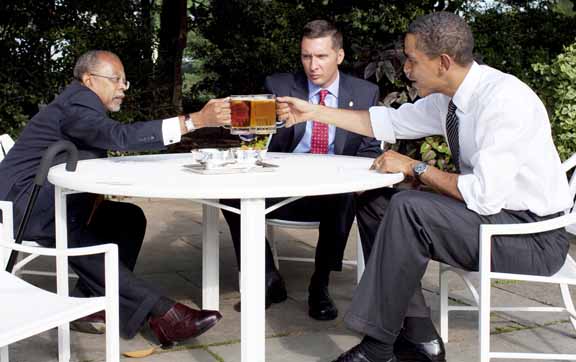
The Beer Summit: Who’s the odd man out?
One of the few Republicans to recognize the racial dimensions of Mr. Obama’s fall from grace is Patrick Buchanan. In a column entitled “Has Mr. Obama Lost White America?” he attributed growing white disapproval to the Sotomayor nomination, the Gates affair, and the racial-transfer aspects of the health-care bill. His advice for Republicans:
An end to affirmative action and ethnic preferences, an end to bailouts of Wall Street bankers, a moratorium on immigration until unemployment falls to 6 percent, an industrial policy that creates jobs here and stops shipping them to China . . .
The Republicans are probably too stupid and too paralyzed by racial angst to take this advice. However, if Mr. Obama continues to show his hand on race there could be enough white resentment against him to elect a stupid, paralyzed Republican in 2012 anyway. In the meantime, Mr. Obama will try to play a cagey reelection game of hiding his anti-white agenda and occasionally reining in subordinates who get too frisky. Like all politicians, his top policy priority is to stay in office, and he still needs a lot of whites votes. It will be only if he manages to squeak in for a second term that we are likely to see in full flower the Barack Obama who nursed his grievances for 20 years in the pews of Jeremiah Wright’s Trinity United Church.















